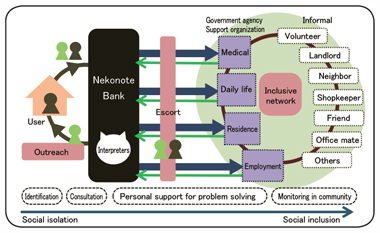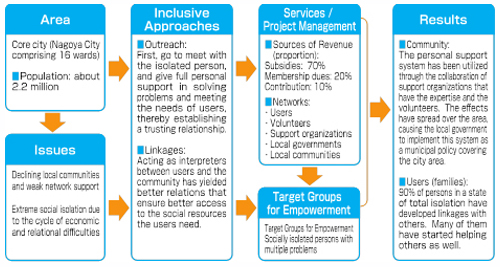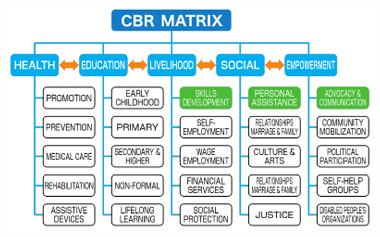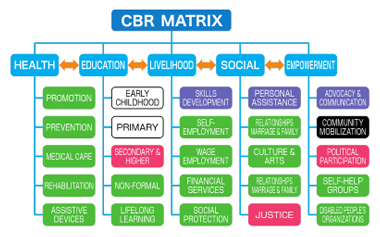Community-Based Inclusive Development
CBID Good Practices
Kusanone Mutual Support Project (General Incorporated Association)
(Nagoya City, Aichi Prefecture)
~ Towards Social Inclusion “Nekonote Bank” A Mutual Support Team for Hard Times~
Key Words Social Inclusion, Outreach
Having interviewed persons with multiple problems and their supporters, we came to realize that many people who have difficulty coping with life are those troubled with both economic and relationship issues simultaneously. Analysis shows that for these people there are no existing social services and welfare systems, hence, resulting in their social isolation. It is for this reason that we have come up with an outreach-type of daily-life support organization that aims for the prevention and elimination of poverty resulting from social isolation, through the continuous provision of personal support services to help them establish trusting relationships, according to their specific needs and situations.
◆Background
There are people who: ① are outside of the social target group covered by existing social services and welfare systems; and ② cannot be reached by many support groups due to relational difficulties with them. With this awareness, we were motivated to do something to help such people who are socially isolated, who are without any support network, and who consequently tend to become impoverished.
◆Service Outline
We visit persons who have difficulties coping with life’s problems and support them through the process of solving their problems. We start by tackling their daily issues. By providing them with step-by-step, continual personal support (staying close), we hope to avert social isolation at an early stage and lead them towards empowerment.
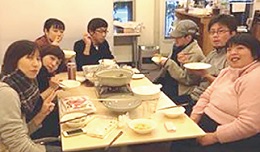
A café where Nekonote Bank users and friends get together. The service users themselves are sometimes engaged in food preparation and cooking. This is where the users can stay and be useful.
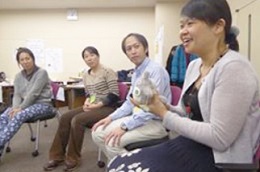
An open meeting called Kusa-Labo in which anyone can participate and present their concerns for discussion. They take turns holding a stuffed animal. Only the one holding it is allowed to speak so that everyone has a chance to speak.
Basic Data
●Area of coverage: Within Nagoya City, Aichi Prefecture (government‐ordinance‐designated city)
●Population: 2.25 million in the city. About 16% of the people are in the state of relative poverty as of 2009 (national average)
●Issues: Declining local communities and weak network support
■Year of Establishment
Kusanone Mutual Support Project was established as a non-statutory organization in 2011. It became a general incorporated association in 2012.
■Contents of Services
●Objectives: A society where nobody is isolated or impoverished.
●Purpose of Services and Target Groups: Our users are those in social isolation and poverty, resulting from the cycle of economic difficulties and the lack of good relations with others. Their isolation is often caused by problems in communication and the lack of understanding of the people around them. Before this situation ends up in the worst-case scenario – suicide – we must try to restore their function to the community by helping them face those with “familiar and everyday difficulties.” Our goal is to help users find situations where they can trust other people and establish good relations with them in the hope that they will no longer be socially isolated.
●Stakeholders: Persons with multiple problems (Persons with developmental disabilities, persons with mental disabilities, persons with intellectual disabilities, patients with incurable diseases, alcoholics, drug addicts, victims of domestic violence and abuse, NEET people, people with school phobia/bullied persons, sexual minority, etc.)
- Main volunteer staff members serving as “interpreters” between the users and society
- Sub-volunteer staff members helping main volunteers provide escort and visitation services.
- Various support organizations with expertise helping to solve various problems
- Local governments (Aichi Prefecture, Nagoya City)
- Members of cross-multiple field support network (Informal Network Nagoya)
- Neighborhood and satellite communities
●Main Source of Revenue: (“Nekonote Bank” funds): Subsidies (Fiscal Year 2013) membership dues, donations
●What We Have Implemented:
- Conducted a survey on the number of people who have difficulty coping with life and who are on the brink of social isolation. (Identifying function)
- Reached out to those persons and established personal, trusting relations through attentive listening. (Outreach function)
- Advocated with society about these people and their issues. (Interpretative function)
- Conducted home visits to users and escorted them to the support organizations that can help them address their problems. (Visiting & escorting function)
- Collaborated with other support organizations/individuals who have the expertise to address their issues. (Network function)
- Obtained general support from the local community which is not covered by any specialized organizations or existing services. (Unofficial function)
- Gradually transferred support roles to some people in the local community and established an inclusive monitoring system. (Monitoring function)
■Special Festures
■New Approach to Solve Social Isolation and Poverty
The core people behind our activities are various kinds of volunteers who came together to study the issue of social isolation (supporters in various fields, persons with disabilities, government employees, company employees, scholars, etc.). We must learn about the users’ issues if we are to help in finding the appropriate solutions through careful hearing survey and analysis. When carrying out support activities, we bear in mind the purpose of our activity and make use of various approaches (brain-storming ideas, group studies, and social experiments) we learned in the “School of Entrepreneurship” implemented by the NPO Support Net for Small and Community Business.
■Interpretative Function and Outreach
As mentioned, many clients with economic difficulties have problems with forming good relations with others due to their poor communication skills, resulting in being trapped by the cycle of isolation. With this in mind, we play the following three roles in our interpretative function and outreach, and try to re-establish linkages between the users and the existing social welfare systems, as well as the local communities, including people in the neighborhood.
- As a personal assistant:
To help the user face everyday challenges together as a team. - As an advocate and communication facilitator:
To help re-establish relations between the user and the society. - As a coach encouraging skill development:
To support the user in acquiring skills for more effective linkage with others in the community.
■Networking Social Resources:
Nekonote Bank is none other than an outreach mechanism that has an interpretative function to re-establish these people’s links with others. To alleviate/solve each difficulty, a particular expertise is required. Existing service providers in each particular field in the local communities are the ones that can offer such expertise. Therefore, we consciously and deliberately try to establish collaborative mechanisms between and among various organizations, including NPOs and government bodies, by holding a “Potluck of What-I-Can-Do Workshop” in various places which was introduced during the “Cooperative Network Project concerning Social Inclusion,” a new public project of Aichi Prefecture (June 2011 – March 2012).
Messages and portraits are posted in the office of the Comprehensive Counseling Center for Children and Youth, which has been entrusted to us by Nagoya City. The Kusanone Mutual Support Project, which was started like pro bono work, consists of people of various talents – including Ms. Watanabe, the Representative Director, who designed the logo – a specialist in summary writing of lectures (for hearing impaired persons), a systems engineer, a government employee specializing in documentation, an expert in sewing, and other persons excelling in something. Everyone’s sharing of “what-I-can-do” supports diversity and sustainability.
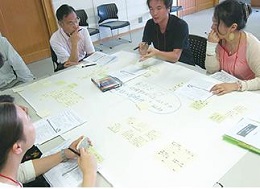
The “Potluck of What-I-Can-Do Workshop” helps isolated people with multiple problems. The members share what they can do to come up with solutions.

■Ripple Effect (Project as a Model)
Since its establishment in 2011, the Kusanone Mutual Support Project has grown tremendously. What is common in all projects is a series of these endeavors: (1) Visiting the persons in needs, (2) engaging in thorough and attentive listening and dialogue with the user, thus establishing a trusting relationship, and (3) linking the user to the appropriate special support and to the local community. When promoting this Project as a model, the most important thing is having this basic policy that “We never exclude a person who does not seem to fit in to an existing system or a common framework,” and keeping in mind that “We will always try to help anyone by creatively utilizing any kind of social resource.” In order to disseminate this mindset in the community and recruit people who share the same belief, it is necessary to hold an open workshop. In one of the workshops called “Kusanone Study Group (Kusa-Labo),” the members take turns being a facilitator, which helps members discover something new through discussions with other members coming from various backgrounds. There are many participants who are called “socially vulnerable.” They can take the lead in discussing issues in society that are directly related to their difficulties. By regularly listening attentively to these discussions with diverse kinds of people, some have changed their attitudes and others have learned to trust others more. Creating such occasions for discussion may be the essence of the Kusanone Mutual Support Project.
■Current lssues and Way Forward
One of our current challenges is that in most cases the isolated people are referred to us by support organizations such as the Comprehensive Counseling Center for Children and Youth. In order for us to identify isolated people earlier, it is imperative to train volunteers with positive attitudes and skills who can cope with various people with diverse difficulties, and also to recruit coordinators who can supervise the volunteers. We have not yet established better ways to recruit and train more volunteers and supervisors, and have not come up with a mechanism of a volunteer bank that can cover the entire Nagoya City. We are currently preparing for the launch of a volunteer bank in collaboration with Nagoya City Hall. We hope that this new type of endeavor, in which ordinary citizens help support the local community using public funds, will become a successful model for the future.
◆How Things Changed
●Working on Individuals
As mentioned, in the Kusanone Mutual Support Project, it is important to visit users regularly, listen attentively and discuss their concerns, and first try to establish a one-on-one relationship of trust, and then, gradually help them expand such relationships with other people. It is only then that the user starts to let us help them, which is the conclusion that Ms. Watanabe and her staff members shared among themselves. In other words, the Kusanone Mutual Support Project is based on an equal relationship between the user and the project members where the user identifies the root cause of his/her difficulty of coping with life and wants to solve the problem. It is not “support or being supported” kind of relationship where one is more superior to the other.
One of our users who used to be completely isolated from his family and community once got in touch with us on the phone, and got connected with the Nekonote Bank. After going through many steps, he now lives alone in the community with some monitoring. He has regained self-confidence enough for him to say, “More people have been supportive of me. I also want to help people like me who are in need of support just as the Kusanone members have supported me.” He has made the first step towards independent living.
●Working with Communities
Matters on diverse challenges are consulted with the Kusanone Mutual Support Project. After identifying a user’s problems, until his/her mind is set towards a solution, the Project’s volunteer staff members patiently provide personal support. In the process of solving specific problems and beyond, we are expected to appropriately refer the users to organizations with the appropriate expertise. Many consultations revealed that many of those who have problems were those whose issues were not addressed by public services or support systems. Some do have multiple problems. In order to address these problems thoroughly, we regularly hold a study group called “Kusanone Study Group (Kusa-Labo)” which welcomes people from all walks of life, forming the “Informal Network Nagoya.” This inclusive type of network consists of various kinds of people, including civic volunteers, pro bono specialists, people facing problems, students interested in welfare, etc., as well as more than 100 support organizations. Through these networks, the Kusanone Mutual Support Project functions as an intermediary, as well. In the case of one young homeless person, since there was a need to address his homelessness urgently once we met him, we collaborated with an NPO known for their expertise in helping the destitute, as well as with other supporters in the government’s welfare services and volunteers of the Nekonote Bank. The most important role of the Kusanone Mutual Support Project, a typical personal support-type of organization, is to create a team that will be close to the subject person and will be committed to help him. Ms. Watanabe says, “Once we are sure that our user has developed strong ties with the community and loved by the people there and that he/she will never be isolated again, that is when we gradually withdraw from the scene. Our role is being with the user only temporarily enough to help him/her establish human relationships.” She knows that her role should be inconspicuous, but vital.
■Analysis Using the CBR Matrix
◆Direct Support from Nekonote Bank Nekonote Bank’s outreach activities:
(1) Personal assistance
(2) Advocacy & communication
(3) Skills development
First, we visit the user (outreach), and provide personal support during the process of addressing the problem the user wants to solve most urgently. The user, who has long been isolated from the community, will regain confidence to connect with others and acquire communication skills, among others.
◆Support in which Nekonote Bank acts as an intermediary between users and communities
Using the three approaches mentioned above, the user will find enough social resources. Those who were previously isolated from the community eventually came to trust others. With the Nekonote Bank’s escort services, they build up relationships with others. They start to have good relations with multiple support organizations and communities (green-coded in the diagram), and organizations with the appropriate expertise (red-coded). Eventually, their abilities will play a role to move the community (black-coded) and they will thus become empowered, which is the ultimate goal.

